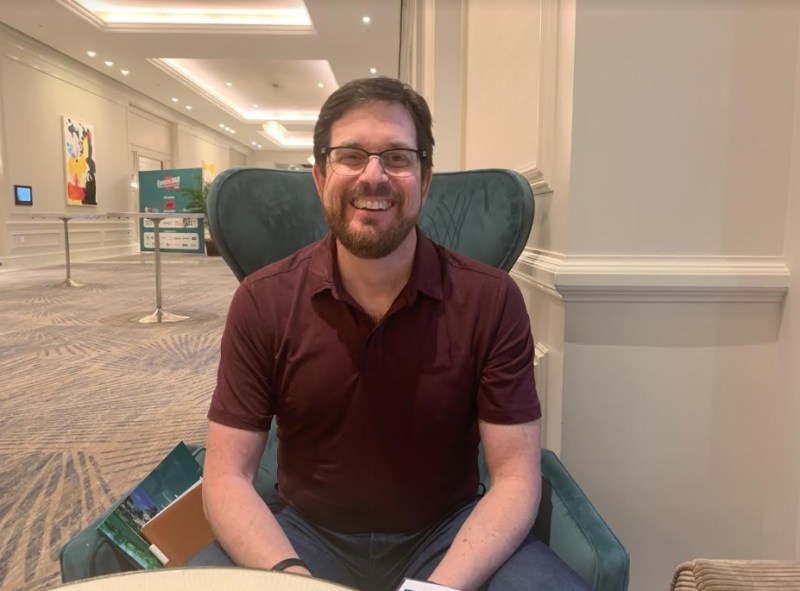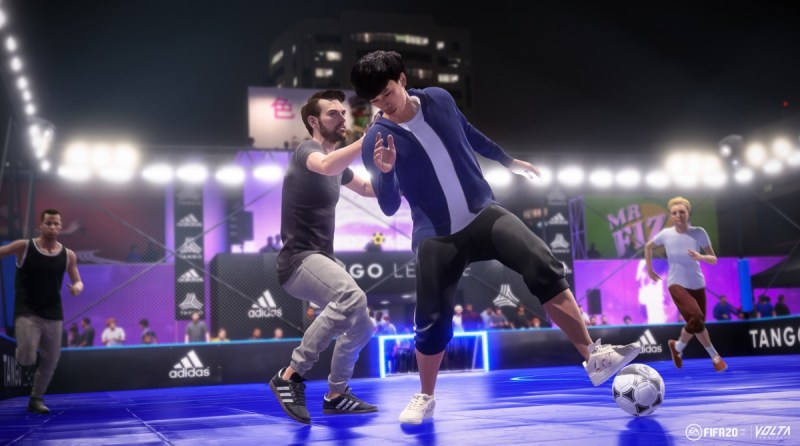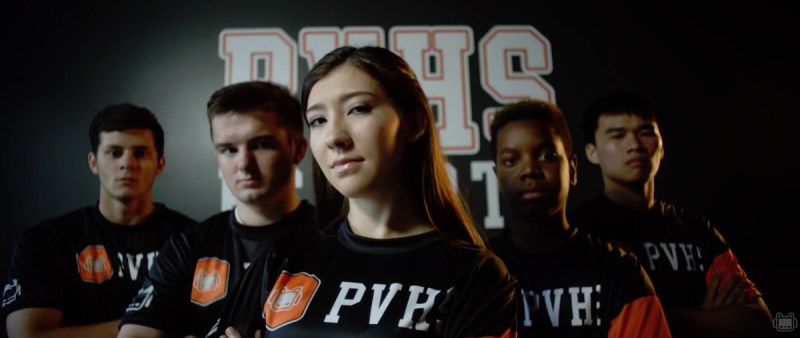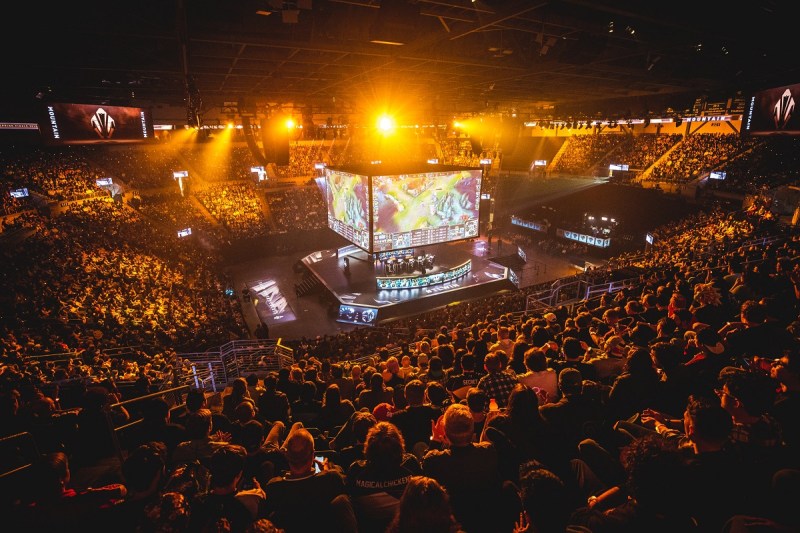Electronic Arts and FIFA the EA Sports FIFA 20 Global Series Road to the FIFA eWorld Cup announced this week. I spoke with Todd Sitrin, senior vice president for competitive gaming at EA, about it.
I joked it was the longest name of an event I had ever seen. A very corporate name, meant to satisfy a number of interests. And it seems that is what esports is becoming.
Esports is no joke. It’s not a renegade piece of the game industry, full of endemic brands like Red Bull trying to get the blood of esports athletes boiling. It’s no longer a wild thing that flips its finger at the mainstream. Esports has become mainstream. It’s a big business, and it enables EA to generate more than 800 million minutes of viewing for last year’s FIFA esports tournaments. Big brands like Pepsico, Anheuser Busch, Mastercard, and Louis Vuitton have seen that, and they are pumping money into esports sponsorship.
And gamers, those who didn’t fit in at high school because they were solitary and nerdy, are becoming hip and social and appreciated by teachers, parents, and college adminstrators who are giving out scholarships for esports athletes. Sounds like a game company’s fantasy. But I talked about this reality with Sitrin at Esports BAR Miami.
June 5th: The AI Audit in NYC
Join us next week in NYC to engage with top executive leaders, delving into strategies for auditing AI models to ensure fairness, optimal performance, and ethical compliance across diverse organizations. Secure your attendance for this exclusive invite-only event.
Here’s an edited transcript of our interview.

Above: Todd Sitrin is senior vice president for esports strategy at Electronic Arts
GamesBeat: That was, I think, the longest name of an event or show I’ve ever seen. EA Sports, etc., the Road Show. Can you remember the whole thing?
Todd Sitrin: I’ve worked a lot of my career with licensed properties. As a result of that, sometimes that does change the naming structure.
GamesBeat: It sounds like something fun, a very good idea.
Sitrin: We’re super excited. This is the first batch of games. FIFA was one of our first when we started the division. This is now officially the third year, third full year. The size that the competition has gotten to has been pretty amazing for me, given that when we started, I wasn’t sure how big things would get. That’s been really positive to see.
GamesBeat: How big was last year’s?
Sitrin: There are a lot of different ways you can gauge it. We look at the number of minutes watched. I think last year we did about 800 million minutes watched. We look at the number of countries that players are coming from. This year we’re projecting players from more than 60 countries around the world.
The other metric we look at in terms of size—because we’re a game affiliated with the real world of football, it’s been our partnerships with football leagues. We’re now up to more than 20 football leagues, including some of the biggest ones, like the Premier League and Bundesliga and La Liga. The MLS in North America. Ligue 1 in France. The UEFA Champions League. They’re all running programs. That’s probably a 40 percent jump year over year, just in that number alone.
GamesBeat: What was the content of the roadshow? Is it human interests sorts of stories on the competitors?
Sitrin: The announcement is the entire season ecosystem for the year, which as I mentioned is moving up in scale around that. You may be referring to—tomorrow at 2PM eastern, we’re having an EA Sports FIFA preview show on our Twitch channel, where people can—some of our casters will be going through all the details.
When you run an open competition, meaning anybody in the world can play – it’s not a closed league situation – there are many different ways you can get involved. You can play for your local club. You can play online and earn your route. You can play for a national team. There’s a lot of different ways. We step through that in this show that we’re doing tomorrow.
GamesBeat: As far as the investment in the broadcast center and so on, how is all that proceeding? Are you saving a lot of money that you otherwise would have had to spend with outside companies to produce these kinds of things?
Sitrin: In general, competitive gaming is a strategic priority for EA. That’s why we’ve made the investments. We’re now working with five different franchises across EA, FIFA being our biggest. Apex Legends is probably our next biggest, and then our sports games — Madden, FIFA Online 4 in Asia, and then we’re partnering with the NHL on their program.
Part of that investment has been not just to create competitions at all levels – ones that we run, one we license out that our partners run — but it’s also been creating new content. We decided that it was better for us to build our own facility. We went online in March of this year.
That has two benefits. The first is it allows you to control the quality of the content much more, because you have your own facility. You can have more creative control and do more innovative things around that. The second is it’s a cost efficiency. Rather than leasing studio time, you’re building an asset. It’s the difference between buying something versus leasing something. There’s something of value that we have.
We’ll be using it tomorrow for our FIFA preview show. We’ve used it for Madden. We’ve been doing shows on some of the games that we’re supporting in the community, things like The Sims, out of that studio as well.

Above: Volta is street football in FIFA 20.
GamesBeat: Did you see the Todd Harris presentation? I wondered if the Skillshot thing was something you could also do, producing content broadcast for other companies.
Sitrin: There’s no reason why we couldn’t, but right now, given the volume of our own franchises, that studio capability is being used at a very high level. We have enough demand for the supply that we’re not seeking out other people to work with right now.
GamesBeat: The other discussion, with the Anheuser Busch people, was also interesting. They’re waking up to the notion that not all those brands will fit in all these different games. An alcohol brand doesn’t fit in all-ages games, like a lot of your EA Sports titles. Do you deal with those kinds of restrictions?
Sitrin: There are some approaches we take because we have licensed properties, where we have to involve the licensor as well. We haven’t really broached that topic for our games. Right now we’ve had a lot of interest because we’re a very accessible esport. We’re probably the most accessible out there, because people understand the rules. They understand the leagues and the players on our sporting sides. But we haven’t yet concluded a deal with anybody in those sorts of areas.
GamesBeat: Battlefield V would also have restrictions on the other end, because companies don’t necessarily want to be associated with violence.
Sitrin: I like to think that EA has the best opportunity of truly getting to mass-market esports. My definition of mass-market entertainment is a piece of entertainment that doesn’t require you to be a player of that entertainment. Something like, in North America, the Super Bowl. What percentage of people who watch the Super Bowl have put on pads and played tackle football? Very small.
Right now the esports industry is primarily made up of viewers who are players of those games. How does the esports industry actually become mass entertainment? It’s going to have to become more accessible. One advantage that sports video games have — in the case of FIFA, there are 4 billion football fans around the world who watch the sport today, who know teams, who know the virtual players on the field. There are also brands all across the world that already feel comfortable making an investment in the sport of football.
That takes down a lot of the barriers to getting to the mass market, because of the familiarity on both the sponsor side and the viewer side. There’s a huge opportunity here. That’s why we’ve seen the type of growth that we’ve seen over the last three years. When I came to my first Esports Bar three years ago, the very first one, most people said, “Why is EA even here? Why would anybody be interested in a sports video game as an esport? If I’m into real sports, why would I choose to watch an virtual version rather than the real thing?”
Year after year we keep posting bigger numbers. It keeps on getting bigger. The answer is, people are drawn to competition. They’re drawn to people and personalities. If there’s a familiarity with them, it’s easier to get into. It’s a gateway into esports, as opposed to what I would call either blood-related – that turns a lot of people off – or just the complexity of other games in our industry that require an incredible level of knowledge to understand anything about what’s going on.
GamesBeat: Do you see potential in esports at the high school level?
Sitrin: We see a lot of potential in getting as many people to play competitively as we can. When we founded the division, the competitive gaming division, our vision statement was to make stars of all of our players. That doesn’t mean that you have to be a professional player to be a star. It means that no matter your skill level, there should be a competition for you.
We’ve always been a big believer, and we’ve done things like collegiate programs. We’ve talked to a lot of players in the high school sports space. We encourage people because we believe that competition is good, whether it’s a virtual sport or a traditional physical sport. It has a lot of benefits. It creates a social network for people. It creates a way to learn how to overcome challenges. It’s a very positive thing. We’re highly supportive of it.

Above: Now you can play esports in high school with PlayVS.
GamesBeat: I interviewed Delane Parnell from PlayVS, and then the 17-year-old who runs the All Star Esports League. I thought they might run into resistance from high school administrators or teachers, just because this is about playing games instead of studying, but they were pointing out that high schools are welcoming them, because they’re giving opportunities to kids who don’t fit in with traditional sports. Traditional sports leave so many kids behind at that age.
Sitrin: I’d say the vast majority. In my high school at least, the people who actually played varsity sports were a minority of the school. All those benefits that come through team sports weren’t being shared by others.
But the other thing is that I think a lot of educators—we’ve seen this in many instances. They realize that if they’re going to connect with their student body, they need to find a way to connect with them through the things they’re passionate about. I know that there are schools that have used, for instance, Madden video games for things like math class, to learn principles of economics. If you’re doing Ultimate Team, one of the modes within all of our EA Sports games, you have to understand a lot of math to be able to do that.
Schools are embracing it, because when they sit there with a textbook and try to explain concepts, they find it kind of falling on deaf ears. When they use something that people are naturally gravitating toward, they find a lot of success. It’s been interesting to see. I’ve been in the industry for almost 25 years. To see the perception of video games and esports 20 years ago versus where it is now, it’s a completely different place.
GamesBeat: They add that it’s a path for those students to become more social. They seem to be happier.
Sitrin: Education isn’t just the class material. It’s also learning about social skills. It’s learning about how to work with other people. It’s about overcoming challenges. These are all things that have been associated with team sports for a long time. But also, joining the band in high school, that’s a social network. You have to perform. You have to learn how to play with other people nicely. Where video games are finally getting to—while I think the students have seen this for a while, now the educators are seeing it too. “This is pretty similar to all the other things we believe in and that we’ve promoted in schools for decades.”
GamesBeat: If that’s an opportunity, does EA have to do anything? Those people will just buy the game and play it.
Sitrin: In the case of esports, it’s helping. It’s facilitating. It’s giving them whatever guidance they need. We’ve work with some of the collegiate programs. They’re looking for some official accreditation. “Hey, we’re legit.” Sometimes they’re just looking for any type of support. In those cases, we’ve done those sorts of partnerships. I’ve had discussions with official collegiate leagues and associations that want to make more of an investment in that area.
That’s the way in which I think a publisher like EA can get involved. It’s good. For the overall competitive gaming division, we know that the vast majority of people—it’s no different than traditional sports. The number of people that play basketball and make it to the NBA is infinitesimally small, just like the number of people who make it to play in an Apex Legends competition.

Above: Esports can fill stadiums for big events — but is that enough?
GamesBeat: But it makes sense for the NBA to help those people become fans of the NBA.
Sitrin: Of course. It makes for great viewership, in the same way that historically the NFL has invested in youth football, and the MLS invests in youth soccer. In the same way, we want to help out in that part of the ecosystem as well. We look at it not as putting on a few events per year and it’s a big show piece sort of thing. We’re approaching it like — what does it take to build an ecosystem that’s healthy for decades?
When you think of it that way, well, what do the high schools need? What do even younger students need? What do colleges need? How do you build that entire ecosystem? We’re just at the start. But going back to the FIFA announcement, part of the journey over the last three years has been building out that ecosystem.
What’s great about FIFA is that EA gets to do it with some partners that are so important in their communities. If you think about how important the Premier League is in England, and the other football leagues around the world, when you’re dealing with that many people who are very interested in growing it, it opens up a lot of doors.
Again, if I compare it to the reaction three years ago when I was at Esports Bar and people were saying, “Why traditional sports?” they saw it as a detriment. Esports is about strategy games and shooters, right? Why would anybody do traditional sports? Well, here’s a good reason. In strategy games and fantasy games and all that, you have the publisher taking on the full burden of advancing the sport. In FIFA we have two or three dozen entities around the world besides EA that are pushing the growth of FIFA esports. That’s a huge advantage. That’s why we’re so excited. I think that’s why things have been growing so rapidly.
GamesBeat: I guess the only danger might be — if you put all this effort into high schools, it might be like boiling the ocean for a payoff that comes decades from now.
Sitrin: Well, you brought up the high schools. I didn’t bring it up.
GamesBeat: I am arguing with myself.
Sitrin: It’s on our road map, but it’s not our focal point. Our focal point is building out our community of players and building out a community of viewers, partnering with our league partners, partnering with others in the space who want to invest and create competitions.
We’re building out what we do inside of the game as well. Something like a third, or closer to 40 percent, of my team at EA spends their time working with our development teams to build out the right features to allow anybody, no matter their skill level, to find a competition. That’s how you get people engaged for a long period of time.
If you play in a competition and you’re playing people who are much better than you, you get frustrated and quit. If you play in a competition where you’re much better than everyone else, you get bored and quit. The key is, can we use competition and tailor it, no matter your skill level? That’s how you make a star of everyone. When you win, even if it’s at the local YMCA level—if I win with my little rec league, I feel like a champion. We want to bring that feeling to as many people as possible. That’s what our focus is on.
Disclosure: The organizers of Esports Bar Miami paid my way to Miami. Our coverage remains objective.


